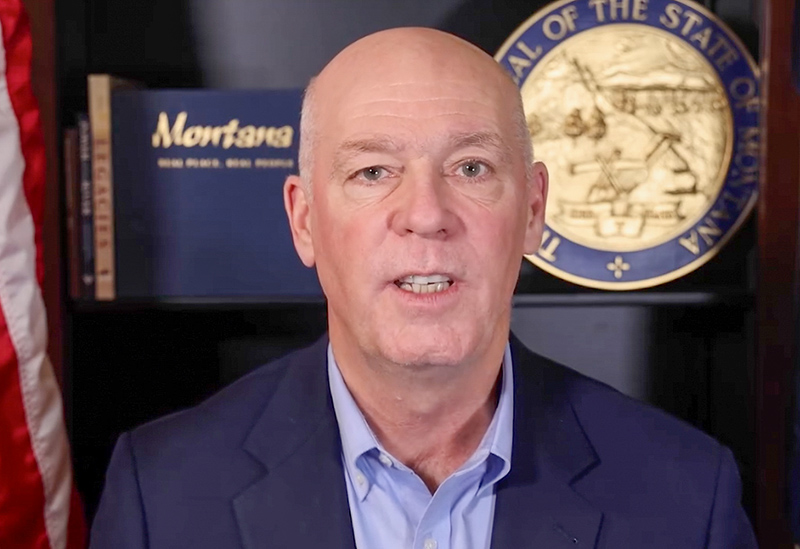Montana governor signs “religious freedom” bill that could allow anti-LGBTQ discrimination
Bill prohibits government from imposing rules or regulations that "substantially burden" a person's right to live out their religious beliefs.

Last week, Montana Gov. Greg Gianforte (R) signed the so-called “Montana Religious Freedom Restoration Act” into effect, prompting criticism from LGBTQ advocates that the new law will condone instances of LGBTQ discrimination under the guise of “religious freedom.”
Under the provisions of the new law, a government agency or actor cannot “substantially burden” a person’s right to exercise their religious beliefs, even if the law that allegedly hinders that right, on its face, applies to all Montanans equally. The government can defend itself against a charge by proving that the “burden” is essential to furthering a governmental interest and is the “least restrictive means” of achieving that interest.
The bill, which purports to be based on the 1993 federal RFRA, allows people who believe their ability to practice their religion has been substantially burdened by the state to sue the state or local governmental agencies for a court order the rule or law from being enforced, as well as damages and the cost of attorney’s fees.
Supporters of the bill say it’s essential to protecting people’s First Amendment rights, and that the new law’s protections could have stopped the state from imposing crowd-size restrictions on houses of worship during the COVID-19 pandemic. Republicans, both in Montana and nationally, have largely balked at any restrictions on multi-person gatherings, seeing it as an overreach of government and an intrusion into people’s daily lives.
Despite promising during his 2016 campaign for governor not to pursue a RFRA law, Gianforte boasted of signing the proposal in a tweet issued last week, writing: “To protect Montanans’ right to freely exercise their religion, I was proud to sign the Religious Freedom Restoration Act today.”
“The governor signed SB215 into law to protect the freedom of people of all faiths to exercise their sincerely held religious beliefs,” a spokesperson for the Governor’s Office told the Helena Independent Record in a statement. “Montana joins 21 other states with RFRA laws, where it has historically been used to allow Native American children to wear braids in school, Sikhs to wear turbans in the military, and Christian employers to refuse to cover abortions under their health insurance policies.”
But critics of the law say that similar measures in other states have been used to justify mistreatment of the members of the LGBTQ community, allowing individuals or businesses to discriminate if they believe a law — such as a nondiscrimination ordinance, for example — infringes upon their religious beliefs.
The bill led dozens of people to protest outside the State Capitol, and prompted more than 250 companies, including major corporations like Molson Coors Beverage Co., Altria Group, Google, Amazon, and Verizon, to co-sign a letter calling on lawmakers to reject four bills — including the RFRA measure — they claimed would “single out marginalized groups.”
Related: U.S. House Democrats introduce bill ensuring religious freedom laws can’t be used to discriminate
Democratic lawmakers and LGBTQ advocates alike protested the RFRA bill, which was also opposed by some Republicans. They also noted that the 1993 RFRA law was used to protect the practices of religious minorities, not to justify turning away people or denying them service because of religious beliefs opposing homosexuality, as several state-level laws have done.
“SB 215, the latest Republican attack on freedom, allows the use of religion as an excuse to discriminate against Montanans,” House Minority Leader Kim Abbott (D-Helena) said. “It’s deeply disappointing that Republicans have focused on these efforts instead of our proposals that actually create jobs in our communities. Democrats will continue fighting for jobs and freedom for all Montanans.”
But Republicans who supported the bill argued that Abbott and other critics were misreading the bill, arguing that attempts to use RFRA to justify discrimination against LGBTQ individuals have failed in most instances. Others, including Sen. Steve Fitzpatrick (R-Great Falls), said the bill does not apply to individuals’ actions, only instances where the government overreaches to infringe on religious liberties.
The American Civil Liberties Union of Montana, however, posited that there is “no doubt” the bill will be used to justify discrimination, especially against transgender youth, and has promised to challenge the RFRA law in court.
See also: Trump ally furious that Biden won’t let him discriminate against LGBTQ people
In 2015, then-Gov. Mike Pence (R) signed a similar RFRA measure into law in Indiana, seeking to allow businesses and individuals the right to refuse to participate in, even tangentially, actions that could be deemed as expressing support for marriage equality, abortion, or other concepts that conflict with their religious beliefs. But the law sparked an economic backlash against the state, forcing Pence to sign a “fix” to the law clarifying that it was not intended to be used to justify discrimination — thus angering social conservatives in addition to liberals who already opposed the law.
In March, Gov. Kristi Noem (R) signed a nearly-identical measure into law in South Dakota.
Alphonso David, the president of the Human Rights Campaign, said the law will “generate serious consequences for all Montanans.”
“SB 215 will have a significant impact on vulnerable communities in Montana — including people of faith, women, and LGBTQ people. It will also jeopardize Montana businesses that voted for Governor Gianforte with the hopes of getting the state’s economy back on track,” David said in a statement. “Let me be clear: religious liberty and equality are not mutually exclusive, and Montanans will not stand by as Governor Gianforte and fearful legislators seek to actively discriminate against the LGBTQ population.”
Read more:
Republican candidate blames his daughter’s bisexuality on Pennsylvania public schools
Biden administration reverses Trump’s ban on embassies flying Pride flags
Transgender man challenges Iowa’s ban on Medicaid coverage for transition-related surgery
Support Metro Weekly’s Journalism
These are challenging times for news organizations. And yet it’s crucial we stay active and provide vital resources and information to both our local readers and the world. So won’t you please take a moment and consider supporting Metro Weekly with a membership? For as little as $5 a month, you can help ensure Metro Weekly magazine and MetroWeekly.com remain free, viable resources as we provide the best, most diverse, culturally-resonant LGBTQ coverage in both the D.C. region and around the world. Memberships come with exclusive perks and discounts, your own personal digital delivery of each week’s magazine (and an archive), access to our Member's Lounge when it launches this fall, and exclusive members-only items like Metro Weekly Membership Mugs and Tote Bags! Check out all our membership levels here and please join us today!
























You must be logged in to post a comment.